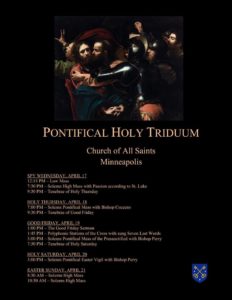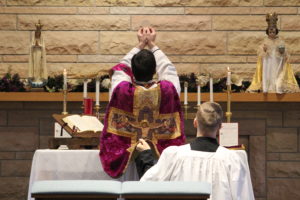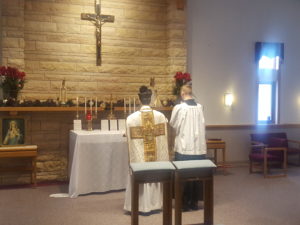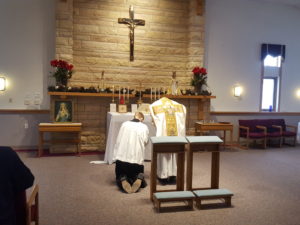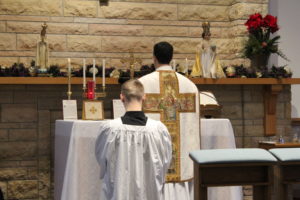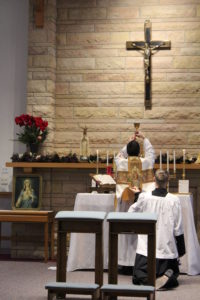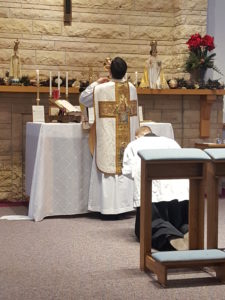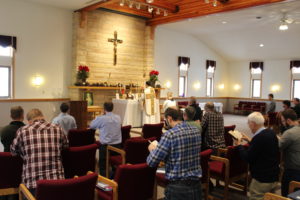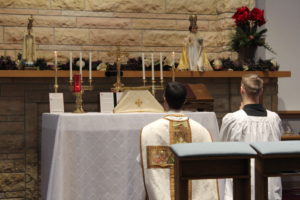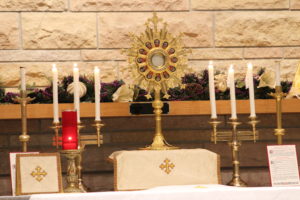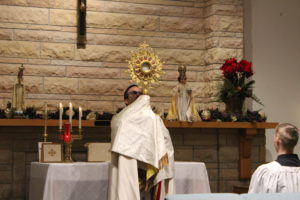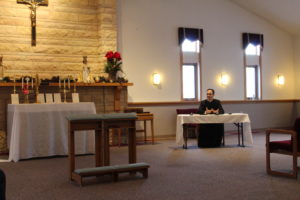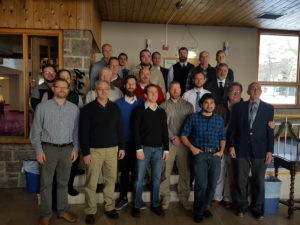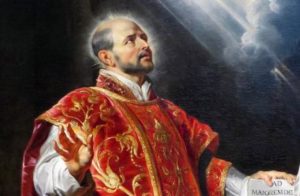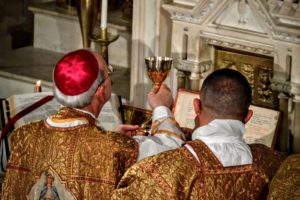
The Offertory is an antiphon: it once was probably a psalm or a collection of psalms, which used to be sung while the faithful made their offerings of bread and wine for the Mass, or of gifts for the use of the clergy. The offerings of bread and wine for the Mass by the faithful began to fall into disuse about the year 1000, but the Offertory and its name are still retained.
At the Offertory we see the oblation of bread and wine by the priest, made after the recitation of the antiphon just mentioned. The Church does not really offer bread and wine absolutely and in themselves, the Church offers them that Christ may convert them into His own Body and Blood.
The antiphon at the Offertory, or as the Missal terms it, “the Offertory,” has necessarily nothing whatever to do with the oblation which it precedes. Thus, on the Fourth Sunday in Advent, the Offertory is the first part of the Hail Mary. The Offertory varies with the season and feast, and is closely connected with the Introit and Gradual, and Communion. The things offered are bread and wine. Both are by the institution of Jesus Christ. The bread used in the Latin Church is made of flour and water without yeast, that is, unleavened bread. In the Greek Church the old custom of using leavened bread is still preserved. Wine, according to the Council of Florence, from the grape alone can be used; thus gooseberry wine is invalid.
By the precept of the Church at least a drop of water, aqua modicissima, says the Council of Florence, is mixed with the wine. The Council of Trent teaches (Sess. xxii.c. 7) that the Church orders a drop or two of water to be mingled with the wine before Consecration, because our Lord is believed to have mingled water with wine at the Last Supper, as also because the mixture of wine and water represents the Blood and Water which flowed from His Side after Death.
The five prayers used at the oblation of bread and wine are of comparatively recent date. The great oblation of Christ’s Body and Blood must be carefully distinguished from the Offertory or anticipatory oblation of bread and wine. The oblation is neither an essential nor an integral portion of the Sacrifice; it is not necessary for its completeness. The oblation is a religious ceremony instituted by the Church to excite the reverence and devotion of the faithful towards the great mystery to be accomplished, while it is the appropriation of the bread and wine to the special service of God.
I proceed to explain these five prayers. The priest raising his eyes to the crucifix and afterwards fixing them on the bread lying on the paten which he holds in his hands, says:
Súscipe, sancte Pater, omnípotens æterne Deus, hanc immaculatam hostiam, quam ego indignus famulus tuus offero tibi, Deo meo vivo et vero, pro innumerabilibus peccátis, et offensiónibus, et negligéntiis meis, et pro ómnibus circumstantibus, sed et pro ómnibus fidélibus christianis vivis atque defúnctis, ut mihi, et illis proficiat ad salútem in vitam ætérnam.
Accept, O Holy Father, Almighty and eternal God, this spotless host, which I, Your unworthy servant, offer to You, my living and true God, to atone for my numberless sins, offenses and negligences; on behalf of all here present and likewise for all faithful Christians living and dead, that it may profit me and them as a means of salvation to life everlasting.
EXPLANATION OF THE PRAYER.
Accept, O holy Father, to God the Father, the Sacrifice of His Son is offered, not to the Blessed Virgin, nor to Saint, or Angel to the Father from whom all paternity descends: Almighty, the epithet is very suitable, since the Sacrifice of the Mass is to show God’s supreme dominion and power over all creatures, eternal, is the attribute of the true God only, always was, is, and always will be; this immaculate Host, the bread by anticipation is called the Spotless Host “receive,” says Benedict XIV. (Bk. ii. c. x. n. 2) on the Mass, “this Spotless Host into Whom this bread is soon to be converted,” which I, Thy unworthy servant, offer unto Thee, my living and true God, God is the source of all life, without Him only death; for mine innumerable sins, mortal and venial, which the priest may have committed by thought, word, deed, and omission; offences are involuntary faults which, through human weakness one commits, which with greater care might be avoided. You hurt your foot by knocking against the table; take greater care not to knock against the table and you will not hurt your foot.
And negligences, such as want of purity of intention, want of correspondence with the special grace God gives His priest, which mars the beauty of an action. And for all here present; the Mass is offered for all present in a special way, because the congregation assisting at Mass gains more abundant fruit from the Sacrifice. For all faithful Christians, the Mass is offered too, for the members of the true Church in the first place, and for all the baptized who serve God outside the body of the Church according to their con science; living and dead, on earth and in Purgatory, that it may be profitable for mine own and for their salvation unto life eternal. Amen. Then making the sign of the Cross with the paten, the Priest places the Host upon the corporal.
THE OFFERING OF THE CHALICE.
The Chalice is offered to God the Father in the same way as the Host, because to Him the Sacrifice is offered.
The priest pours wine into the chalice, and by the command of the Church adds a drop or two of water, having previously blessed it with the sign of the Cross. The wine is said to represent Jesus Christ and the water the people. The wine is not blessed, since it will soon be changed into the Blood of Christ at the Consecration; the sign of the Cross is made over the water, as representing the people who need to be blessed before they are united with Jesus Christ. The mingling of water with wine is also said to represent the union of the people with Jesus Christ (Council of Trent, Sess. xxii. c. 7.)
Deus, qui humánæ substántiæ dignitátem mirabiliter condidísti, et mirabilius reformásti: da nobis per hujus aquæ et vini mystérium, ejus divinitátis esse consórtes, qui humanitátis nostræ fieri dignátus est párticeps, Jesus Christus Filius tuus Dóminus noster: Qui tecum vivit et regnat in unitáte Spíritus Sancti Deus, per ómnia sæcula sæculórum. Amen.
O God, who established the nature of man in wondrous dignity, and still more admirably restored it, grant that by the mystery of this water and wine, may we come to share in His Divinity, who humbled himself to share in our humanity, Jesus Christ, Your Son, our Lord. who lives and reigns with You in the unity of the holy Spirit, one God, forever and ever. Amen.
EXPLANATION OF THE PRAYER IN MINGLING THE WATER AND THE WINE.
The drift of the prayer is that we may be sharers in the divine nature, according to these words of St. Peter (2 *. 4): “by whom He hath given us most great and precious promises that by them you may be made partakers of the divine nature.” By sanctifying grace we become the adopted children of God, and are most closely united to Him. We ask the grace “by the mystery of the water and wine,” that is, by the Passion and Death of our Saviour, when blood and water flowed from His side, and He as Man satisfied for us, began and perfected the work of our redemption.
The priest then, having moved to the middle of the altar, takes the Chalice by the knob in one hand and with the other supporting the foot, holds it about the height of his eyes, and fixing them on the crucifix, says:
Offérimus tibi, Dómine, cálicem salutáris tuam deprecántes cleméntiam: ut in conspéctu divinæ majestátis tuæ, pro nostra et totíus mundi salúte cum odóre suavitátis ascéndat. Amen.
We offer You, O Lord, the chalice of salvation, humbly begging of Your mercy that it may arise before Your divine Majesty, with a pleasing fragrance, for our salvation and for that of the whole world. Amen.
EXPLANATION OF THE PRAYER IN OFFERING THE CHALICE.
We offer unto Thee, O Lord, the Chalice of salvation the words ” chalice of salvation ” are taken from the ii5th Psalm they refer, by anticipation, to the Blood in the Chalice, after the Consecration, shed for our salvation, just as in the Offering of the Host, ” Spotless Host,” refers, by anticipation, to the Consecrated Host, beseeching Thy clemency, that in the sight of Thy Divine Majesty it may ascend with the odour of sweetness for our salvation and for that of the whole world, for not merely upon Catholics but upon the whole world, graces descend through the power of the Mass.
Why, it may be asked, does the priest say “we” offer and not “I” offer? Because at Solemn Mass or High Mass the assisting deacon joins with the priest in offering the chalice. The Church has only one liturgy, and its form supposes that more solemn celebration of High Mass, which is dearer to her heart. Low Mass differs from High Mass chiefly in omissions.
The priest then makes the sign of the Cross with the chalice, places it upon the corporal, and covers it with the pall. Then with his hands joined upon the altar, and slightly bowing down, he says:
In spíritu humilitátis, et in ánimo contrito suscipiámur a te, Dómine, et sic fiat sacrificium nostrum in conspéctu tuo hódie, ut pláceat tibi, Dómine Deus.
In a humble spirit and with a contrite heart, may we be accepted by You, O Lord, and may our sacrifice so be offered in Your sight this day as to please You, O Lord God.
This prayer is more or less modelled on the prayer of the three children in the fiery furnace as given in Daniel, third chapter, vv. 39, 40. They walked in the midst of the flames praising God, refusing to adore the golden statue set up by Nabuchadonosor. They offered their bodies as victims to obtain mercy for themselves and others. The priest with contrite heart offers the Sacrifice for the sins of the world. Next, the priest raising his eyes and stretching out his hands, which he afterwards joins, makes the sign of the Cross over the Host and Chalice while he says:
Veni, Sanctificátor omnípotens ætérne Deus, et bénedic hoc sacrificum tuo sancto nómini præparátum.
Come, O Sanctifier, Almighty and Eternal God, and bless, this sacrifice prepared for the glory of Your holy Name.
EXPLANATION OF THE PRAYER VENI SANCTIFICATOR.
This invocation is addressed to the Holy Ghost. In the language of the Church, the Holy Ghost is called the Sanctifier, and to Him the work of sanctification is specially attributed. Thus we speak of the seven gifts not of the Father and Son, but of the Holy Ghost: all meant for our sanctification. The word “bless” has various meanings. It may mean a prayer as of a father over his child God bless you, which may not take effect. God’s blessing carries infallibly virtue with it. The priest in blessing and in sanctifying by the sign of the Cross the bread and wine on the altar begs the presence in them of the Lamb of God, and implores of the Holy Ghost transubstantiation, which is God’s greatest work.
The priest with his hands joined goes to the Epistle side of the altar, where he washes his fingers, and recites a portion of the 25th Psalm.
The washing of the fingers is the sign of the perfect cleansing of the heart required for the worthy celebration of the Holy Mass.
The tips of the fingers, the thumb and forefinger, which at his ordination were consecrated for the offering of the adorable Sacrifice, and not the hands, are washed to express that the priest should be clean wholly (see St. John xiii. 10). The Lavabo, that is, the verses from the 25th Psalm, run thus:
- I will wash my hands among the innocent: and will encompass Thy altar, O Lord.
- That I may hear the voice of praise, and tell of all Thy marvelous works.
- I have loved, O Lord, the beauty of Thy house and the place where Thy glory dwelleth.
- Take not away my soul, O God, with the wicked, nor my life with bloody men.
- In whose hands are iniquities: their right hand is filled with gifts.
- As for me, I have walked in my innocence: redeem me and have mercy on me.
- My foot hath stood in the right path: in the churches I will bless Thee, O Lord.
Glory be to the Father, etc.
EXPLANATION OF THE LAVABO.
David’s prayer to be delivered from exile and to worship God in His tabernacle is placed by the Church in the mouth of the priest. In the first verse David alludes to a custom among the Jews, who before entering into the Tabernacle purified themselves and the victims they offered, and this external washing is the sign of internal purity. David says, I will wash my hands among the innocent, as a sign of real inward purity, as an innocent person would wash them; and not with the hypocrites, who do so with clean hands and unclean hearts.
Such verses as I will wash my hands among the innocent, and as for me, I have walked in my innocence (v. 6), in no sense deny that the priest is a sinner. These words have no boastful tone for the priest adds, redeem me and have mercy on me.
There is a true sense in which every priest striving to serve God may use the words, “I have walked in my innocence.” The priesthood is a state of innocence secured by its obligations against many forms of evil. The priest speaks more or less in the name of his order. The priesthood has a multitude of graces to secure it from sin, and the language of David, a penitent sinner, in the mouth of the priest from the knowledge it implies of the priestly state and of what a priest ought to be, fills any priest with a humbling sense of his unworthiness for such an exalted position.
Returning to the middle of the altar and bowing slightly with hands joined, to imitate, as St. Thomas says, the humility and obedience of Jesus Christ, the priest says:
- Súscipe sancta Trinitas, hanc oblatiónem, quam tibi offérimus ob memoriam
passiónis, resurrectiónis, et ascensionis Jesu Christi Dómini nostri: et in honórem beátæ Mariæ semper Vírginis, et beáti Joánnis Baptistæ, et sanctórum Apostolórum Petri et Pauli, et istórum, et ómnium Sanctórum: ut illis proficiat ad honórem, nobis autem ad salutem: et illi pro nobis intercédere dignéntur in coelis, quorum memoriam ágimus in terris. Per eúmdem Christum Dóminum nostrum.
S. Amen.
- Accept, most Holy Trinity, this offering which we are making to You in remembrance of the passion, resurrection, and ascension of Jesus Christ, Our Lord; and in honor of blessed Mary, ever Virgin, Blessed John the Baptist, the Holy Apostles Peter and Paul, and of (name of the Saints whose relics are in the Altar) and of all the Saints; that it may add to their honor and aid our salvation; and may they deign to intercede in heaven for us who honor their memory here on earth. Through the same Christ our Lord.
S. Amen.
EXPLANATION OF THE PRAYER SUSCIPE SANCTA TRINITAS.
This prayer clearly brings out certain points of doctrine. The preceding prayers of the Offertory are addressed to the Father and Holy Ghost this prayer to the three persons of the Godhead, to whom alone and not to the Blessed Virgin or the Saints the Sacrifice of the Mass is offered. Sacrifice is (1) the supreme act of worship to God alone. The offering is in memory of the Passion, for the Eucharist, especially in the double Consecration of bread and wine, is a memorial of His Passion; (2) in memory of the Resurrection, for the immortal body of Jesus Christ is consecrated; (3) in memory of the Ascension, for Christ who died for us and rose again in the same Body which lies in the Eucharist, has ascended into Heaven to intercede for us. The Sacrifice is offered in honour of our Lady and the Saints; not to them, and the motive is that our Lady and the Saints may intercede for us in Heaven. In honouring His Mother and the Saints we honour our Lord in His best works.
Next the priest kisses the altar as a sign of affection for the relics of the Saints buried there and much more for our Lord, and turning towards the people, extending and joining his hands, he raises his voice a little and says:
Brethren, pray that my Sacrifice and yours may be acceptable to God the Father Almighty.
“Brethren” is used without distinction of sex. The human race after Baptism is one family, we are baptized children of God, we are strengthened by the same Sacraments, fed by the same food, call God our Father, and are destined for the same reward. The answer of the server is as follows:
May our Lord receive the Sacrifice from thy hands, to the praise and glory of His name, to our benefit, and to that of all His holy Church.
The priest answers in a low voice Amen, and with outstretched hands recites the Secret prayers.
THE SECRET.
The Secret is so-called because the prayers are said in a low voice inaudible to the people.
The number of the Secrets is the same as that of the Collects.
The difference between the Collect and Secret is that the Collect is a special prayer to God or relates to the feast of the day without reference to the Sacrifice at all. The Secrets are in keeping with the name originally given to them, prayers over the offerings (orationes super oblata). In the Offertory we ask God to accept, bless, sanctify, and consecrate the gifts offered, in the Secret we implore of Him the graces we require, as in a certain sense the fruit or effect of the offerings made. Thus, in the Secret for Pentecost, we read: Sanctify, we beg of Thee, O Lord, the gifts we have offered, and cleanse our hearts by the light of the Holy Spirit, and the Secret for Corpus Christi says: We beseech Thee, O Lord, mercifully to grant to Thy Church the gifts of unity and peace which are mystically figured under the gifts we offer, through Thy Son, Jesus Christ, our Lord, who liveth and reigneth, world without end.
THE PREFACE.
The Preface, as its name indicates, is the introduction to the Canon, the most solemn portion of the Mass, which includes the Consecration. If we consider the Introit (introitus, entrance) with the preceding prayers as a general introduction to Mass, then the Preface may be considered as the special introduction to the Canon.
The general purport of the Preface is to thank God for all His mercies, to call on the angels to assist at the great Sacrifice, and to place ourselves in communion with them in the songs of adoration and love which they present at the throne of God.
There are in all eleven Prefaces the Common or ordinary Preface, for days to which no other is appropriated, and the special Prefaces for the Nativity, used during the octave of Christmas, for the feasts of the Holy Name, of the Purification, of Corpus Christi, and of the Transfiguration; for the Epiphany, and for Lent; for Passiontide, used on the feasts of the Invention and Exaltation of the Cross, of the Passion of our Lord, on the Fridays of Lent and for the Sacred Heart; for Easter, the Ascension, Whit Sunday; the Preface for Trinity, used on all Sundays in the year which have no Preface of their own; the Preface for the Apostles, said also on the feasts of St. Peter’s Chair at Rome and at Antioch. The Preface for our Lady was fixed by Urban II., at the close of the eleventh century, 1088.
The Preface is divided into three parts. The introduction and conclusion are always the same: the middle changes with the feast and the ecclesiastical year.
- Dominus vobiscum.
- Et cum spiritu tuo.
- The Lord be with you.
- And with thy spirit.
Here the Priest uplifts his hands:
- Sursum corda.
- Habemus ad Dominum.
- Lift up your hearts.
- We have them lifted up unto the Lord.
He joins his hands, and bows his head while he says:
- Gratias agamus Domino Deo nostro.
- Digmim et justum est.
Vere dignum et justum est aequum et salutare, nos tibi semper, et ubique gratias agere; Domine sancte, Pater omnipotens, aeterne Deus; per Christum Dominum nos trum. Per quern Majestatem tuam laudant Angeli, adorant Dominationes, tremunt Potestates. Coeli, coelorumque vir- tutes,ac beata Seraphim, socia exsultatione concelebrant. Cum quibus et nostras voces, ut admitti jubeas deprecamur, supplici confessione dicentes, Sanctus, Sanctus, Sanctus, Dominus Deus Sabaoth. Pleni sunt coeli et terra gloria tua. Hosanna in Excelsis. Benedictus qui venit in nomine Domini. Hosanna in Excelsis.
- Let us give thanks to the Lord our God.
- It is meet and just.
It is truly meet and just, right and salutary, that we should always, and in all places, give thanks to Thee, O Holy Lord, Father almighty, eternal God, through Christ our Lord. By whom the Angels praise Thy Majesty, the Dominations adore, the Powers tremble before It. The Heavens and the Heavenly Virtues and the blessed Seraphim do celebrate with united joy. In union with whom we beseech Thee to ordain that our voices be admitted, saying in suppliant accord, Holy, Holy, Holy, the Lord God of hosts. Full are the heavens and the earth of Thy glory. Hosanna in the highest. Blessed is He who cometh in the name of the Lord. Hosanna in the highest.
EXPLANATION OF THE INTRODUCTION TO THE PREFACE.
The words Per omnia saecula saeculorum belong to the Secret. The Introduction consists of three versicles with their responses. The priest opens with the customary greeting Dominus vobiscum, without turning as usual towards the people, thereby showing that he is wholly wrapt in the thought of the great action soon to be accomplished. He is conversing with God face to face. The server answers, or at High Mass the choir chants, et cum spiritu tuo may God be with thy spirit, O Priest. The Priest raising his hands, suit ing the action to the word, says the words Sursum corda lift up your hearts as an invitation to raise our thoughts to heavenly things. To this invitation the people respond, we have them lifted up unto the Lord, that is, our hearts are already lifted up and with our Lord. The priest joins his hands and bows his head while he adds Let us give thanks to the Lord our God, a tribute which is due to God for all His benefits and especially for the gift of the Blessed Sacrament which comes to us through the Holy Mass. The word Eucharist, as we have seen, means thanksgiving. The faithful answer through the server, it is meet and just: meet in respect of His manifold benefits, and just on our part who so largely enjoy them.
These words close the introduction which is thought to have been composed by the Apostles.
EXPLANATION OF THE PREFACE.
We now come to the Preface itself and shall select the Common Preface for explanation. The priest begins the Preface by echoing the spirit of the response and repeating it with increased force. It is truly meet and just, right and salutary; meet with respect to God whose benefits we acknowledge by thanking Him for them, while this very act proclaims our own feeling of gratitude; just, for thanksgiving is an obligation of justice; right both on these and ail other accounts; salutary, for it conduces to our salvation; that we should always, and in all places, give thanks to Thee, that is on every conceivable occasion, laughing and weeping, living and dying we should thank God. Holy Lord, Father Almighty, Eternal God, through Christ our Lord. These words are addressed to God the Father. Each epithet, Holy, Almighty, Eternal, is used in the strict sense here and belongs to God alone. By whom the angels praise Thy Majesty, the Dominations adore, the Powers tremble before It, the Heavens and the Heavenly Virtues and the Blessed Seraphim do celebrate with united joy. The introduction of the Angels into the Preface adds much solemnity to its words. There are nine Choirs of Angels: Angels, Archangels, Virtues, Powers, Principalities, Dominations, Thrones, Cherubim and Seraphim. It is distinctly said that the angels praise God the Father through our Lord, their Chief and Mediator. The word “angels” is not taken in a general sense, but specifically the first choir. The Dominations seem to annihilate themselves in adoring the Majesty of their Creator the Dominations adore. The Powers, so called says Gregory the Great, because by their strength they overcome the demons, tremble before It, that is, are filled with a reverential fear (tvemunt Potestates). The Heavens, that is, the entire Heavenly Host; the Virtues, perhaps the Choir of Angels through whose agency miraculous signs are made, and the Blessed Seraphim, the highest choir of all, called Blessed because of their incomparable love for God, in common jubilee glorify God’s Majesty.
Here four different emotions or actions are ascribed to the angels in which we are to imitate them: namely, praise, adoration, awe, and joy.
The priest next prays in the name of the faithful and in his own. In union with whom we beseech Thee to ordain that our voices be admitted in suppliant accord (our humble voice of praise) saying: now comes the conclusion of the Preface.
- Holy, holy, holy, the Lord God of hosts. Full are the heavens and the earth of Thy glory.
- Blessed is He who cometh in the name of the Lord. Hosanna in the highest.
The first verse is taken from the sixth chapter of Isaias, v. 3, where the Prophet describes the glorious vision of the Lord’s throne and the Seraphim “cried one to another, saying Holy, holy, holy, Lord God of hosts, all the earth is full of His glory.” The three-fold repetition of holy is perhaps in honour of the Trinity, Father, Son, and Holy Ghost, distinct in person, the same in nature.
The second verse is the repetition of the cries of joy by the crowd in St. Matthew (xxi. 9) as our Lord entered Jerusalem on Palm Sunday. “Blessed is He that cometh in the name of the Lord. Hosanna in the highest.”
Hosanna means “Save we pray” much like our expression, God save the King, or the French Vive I Empereur. Blessed is He who cometh in the name of the Lord refers to Jesus Christ, who is in the full sense of the word blessed, for He is the source of every blessing.
The words Blessed is He who cometh refer directly to our Lord’s coming in the Eucharist. The Church seems to give this interpretation in her rubric which prescribes these words to be sung by the choir after the Consecration.


